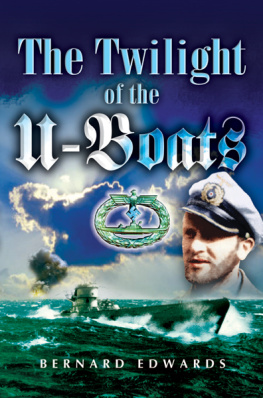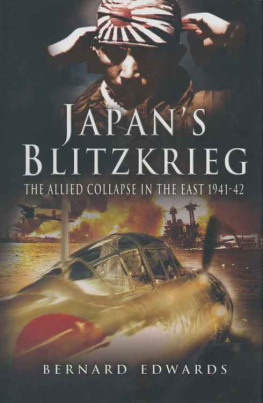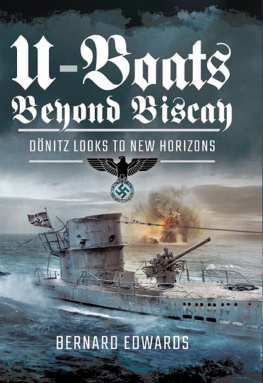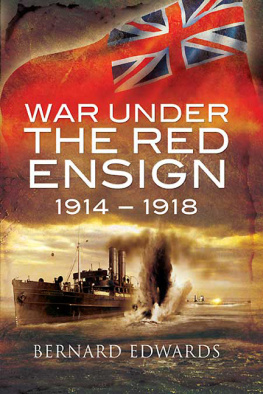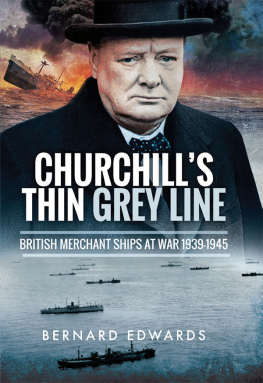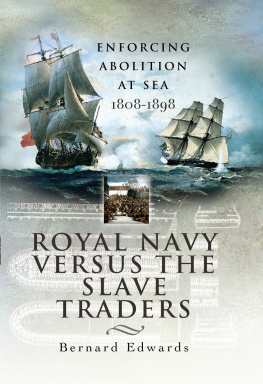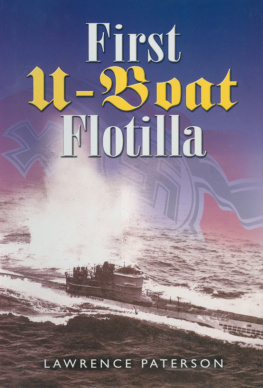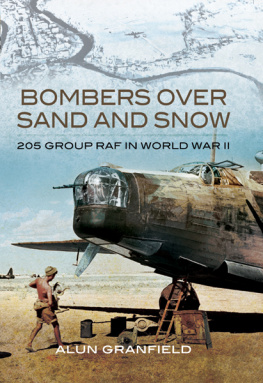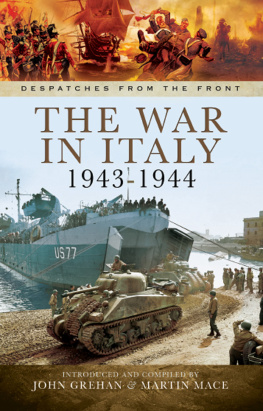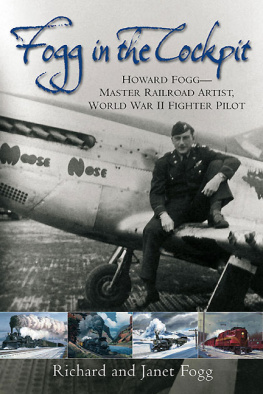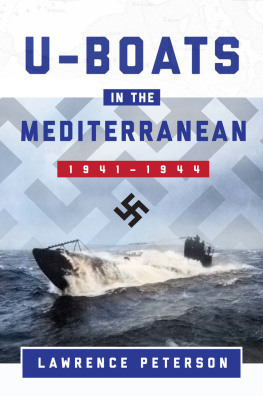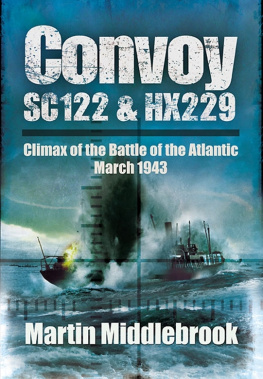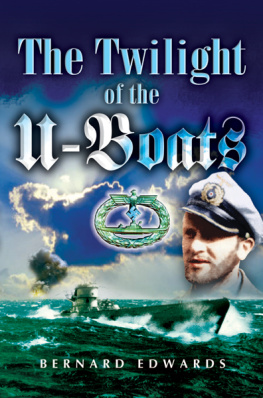Bernard Edwards - Twilight of the U-Boats
Here you can read online Bernard Edwards - Twilight of the U-Boats full text of the book (entire story) in english for free. Download pdf and epub, get meaning, cover and reviews about this ebook. year: 2003, publisher: Pen and Sword, genre: Home and family. Description of the work, (preface) as well as reviews are available. Best literature library LitArk.com created for fans of good reading and offers a wide selection of genres:
Romance novel
Science fiction
Adventure
Detective
Science
History
Home and family
Prose
Art
Politics
Computer
Non-fiction
Religion
Business
Children
Humor
Choose a favorite category and find really read worthwhile books. Enjoy immersion in the world of imagination, feel the emotions of the characters or learn something new for yourself, make an fascinating discovery.
- Book:Twilight of the U-Boats
- Author:
- Publisher:Pen and Sword
- Genre:
- Year:2003
- Rating:3 / 5
- Favourites:Add to favourites
- Your mark:
- 60
- 1
- 2
- 3
- 4
- 5
Twilight of the U-Boats: summary, description and annotation
We offer to read an annotation, description, summary or preface (depends on what the author of the book "Twilight of the U-Boats" wrote himself). If you haven't found the necessary information about the book — write in the comments, we will try to find it.
Twilight of the U-Boats — read online for free the complete book (whole text) full work
Below is the text of the book, divided by pages. System saving the place of the last page read, allows you to conveniently read the book "Twilight of the U-Boats" online for free, without having to search again every time where you left off. Put a bookmark, and you can go to the page where you finished reading at any time.
Font size:
Interval:
Bookmark:
By the same author
Masters Next to God
They Sank the Red Dragon
The Fighting Tramps
The Grey Widow Maker
Blood and Bushido
SOS Men Against the Sea
Salvo!
Attack and Sink
Dnitz and the Wolf Packs
Return of the Coffin Ships
Beware Raiders!
The Road to Russia
The Quiet Heroes
First published in Great Britain in 2004 by
LEO COOPER
an imprint of Pen & Sword Books
47 Church Street,
Barnsley,
South Yorkshire,
S70 2AS
Copyright 2004 by Bernard Edwards
ISBN 1 84415 035 6
PRINT ISBN: 9781844150359
PDF ISBN: 9781783377459
EPUB ISBN: 9781783379453
PRC ISBN: 9781783379255
A catalogue record for this book
is available from the British Library
Typeset in 11/13pt Sabon by
Phoenix Typesetting, Auldgirth, Dumfriesshire
Printed in England by CPI UK
For Hamburg and some old memories.
For Ive a husband out at sea
Afloat on feeble planks of wood;
He does not know what fear may be;
I would have told him if I could.
Christina Rossetti
Contents
Prologue
At the seaward end of Kiel harbour a tall monument to war dominates the eastern foreshore at Mltenort. Built of red Weser sandstone, topped by a bronze eagle, wings outstretched, the U-boat memorial contains a record, flotilla by flotilla, boat by boat, man by man, of the price paid for Germanys bid to win control of the sea lanes.
The flowers that honour the dead in the shaded cloisters of the memorial are always fresh, and the pages of the Book of Remembrance are still turned each day, but the heady scent of glory is no longer in the air. Now, in winter, when the fog rolls in from the Kattegat, the ghosts of those whose bones lie in the deep waters listen to the mournful wail of sirens as ships pass by unmolested offshore. In summer, day trippers, most too young to remember war, sunbathe and play on the beach below, unaware that they are in the shadow of momentous history.
They are old men now, those of Grand Admiral Dnitzs submariners who survived, reliving the war days at reunions and paying homage at Mltenort when their ageing bodies allow. But they have a pride, for misguided though they may have been, they fought a good fight. Theirs was a cruel trade but, with a few exceptions, they played by the rules. The toll they exacted of Allied merchant shipping was unprecedented; 2,828 ships totalling 14,687,231 tons gross were sent to the bottom, taking with them many millions of tons of cargo. But this staggering achievement was not without grievous cost; 739 U-boats were lost, and 28,728 men died with them. It was a heavy sacrifice that was so very nearly justified, for in 1943 the U-boats almost succeeded in breaking the Allied supply lines. Had they done so, they would have changed the course of history forever.
Chapter One
Atlantic Shooting Gallery
For those who struggled to keep open the sea lanes between Britain and the Americas, the winter of 1942-43 in the North Atlantic was a nightmare of unrelieved horror. For those intent on opposing them, it was no less.
It was one of those winters when this consistently hostile ocean was at its worst, swept by an unending procession of vigorous depressions, each one following so close on the heels of the other as to give no let-up in the ferocity of the weather. Hurricane-force winds, mountainous seas, accompanied by scudding clouds at mast-top height and driving rain sleet or snow if the latitude was high were all that the ocean seemed to know. For those obliged to challenge this unrelenting maelstrom, whether shipping green seas in a geriatric tramp, roller-coasting from crest to trough in a tiny escort corvette, or lashed in the conning tower of a half submerged U-boat, the days were nerve-racking, the nights full of dark fears. How they longed for the warm kiss of the tropic breeze and the gentle push of a storm-free swell. But, for all of them, there was a battle to be fought, a war to be won.
In November 1942, the Battle of the Atlantic appeared to be going only one way and that was in favour of Admiral Dnitzs wolf packs. Up to 100 U-boats were operating in the North Atlantic, searching out, shadowing, and ambushing Allied ships as they fought their way to and fro across the ocean. British and American troops had landed on the North African coast early in the month with a subsequent huge increase of the number of ships ferrying supplies, arms and ammunition on the west to east route. In spite of the appalling weather, which served to hide some of the convoys from view, they were Iron Cross days for the U-boats. In November, no fewer than 117 merchantmen, totalling 718,000 gross register tons, most of them deep-loaded for North Africa, fell to German torpedoes. As the year drew to a close, so the situation worsened, the final count for 1942 being 7.8 million tons of Allied shipping lost. And this was at a time when, even with the prodigious output of the American yards, the Allies built only 7.2 million tons in replacement. Unless the run of the tide was checked, the outcome of the war was in the balance.
As the year 1942 drew to a close, further south, in the sundrenched Caribbean, and as far from the sound of the drums of war as anyone could wish to be, a convoy was about to leave Port of Spain, Trinidad. The convoy, designated TM 1, Trinidad Mediterranean, was the first of its kind. It consisted of nine oil tankers, the British Dominion, 6,983 tons, the British Vigilance, 8,093 tons, the Empire Lytton, 9,807 tons and the Oltenia II, 6,394 tons, all sailing under the Red Ensign, the Norwegianregistered Albert. L. Ellsworth, 8,309 tons, Cliona, 9,000 tons, Minister Wedel, 6,833 tons, and Vanja, 9,807 tons, and the American-owned, Panama-flag Norvik, 10,034 tons. These were all well-found, well-manned ships, carrying between them in excess of 30 million gallons of aviation spirit and diesel oil for Allied forces in North Africa. Given the nature of this cargo, and its vital importance to the Allied cause, it would have been expected that TM 1 would be under heavy escort for its Atlantic crossing. This was not so.
Northern convoys apart, the British and US navies were stretched to the limit in this theatre of the war, a great number of ships being required to cover the beachheads of Operation Torch in North Africa. All that could be spared for TM 1 was a small force of the Royal Navys B 5 Escort Group, namely the Havantclass destroyer Havelock, supported by the Flower-class corvettes Pimpernel and Saxifrage and Godetia, the latter being Belgianmanned. Under the command of an experienced Senior Officer Escort (S.O.E.) Commander Richard Boyle, RN in HMS Havelock, this was a tough, battle-hardened quartet, but they were hardly adequate for the job in hand. It can only be surmised that, with large numbers of U-boats known to be then engaged further north with the slow westbound convoy ONS 154, the Admiralty considered TM 1 would be safe enough on the crossing until covered by destroyers and aircraft from Gibraltar. The B 5 Group ships arrived in Port of Spain late on 27 December after a rough passage from New York, relieved to be in quieter waters, but urgently in need of refuelling, provisioning and repairs. Apart from other minor faults, Havelocks HF/DF, essential for tracking U-boats, was only working intermittently, and Godetia had one boiler out of commission. There would be little rest that night for Commander Boyles men.
The convoy was scheduled to sail before noon next day, 28 December, but having worked through the night to bring his escorts into a state of readiness, Commander Boyle was dismayed to find the tankers were dragging their heels. It was not until halfway through the afternoon that TM 1 pulled out of Port of Spain, and then it had to leave three of the tankers,
Next pageFont size:
Interval:
Bookmark:
Similar books «Twilight of the U-Boats»
Look at similar books to Twilight of the U-Boats. We have selected literature similar in name and meaning in the hope of providing readers with more options to find new, interesting, not yet read works.
Discussion, reviews of the book Twilight of the U-Boats and just readers' own opinions. Leave your comments, write what you think about the work, its meaning or the main characters. Specify what exactly you liked and what you didn't like, and why you think so.

